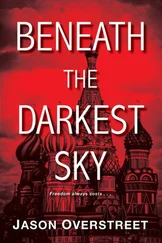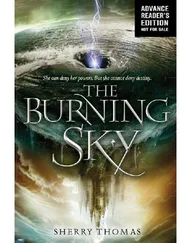“Don’t yell,” said Kit evenly. “If that’s the way you feel, it’s all right with me. But you ought to be bright enough to understand that not everybody feels the same way.”
They got up. The Lyles smiled from their corner as the trio left the room.
Tunner announced: “I’m off for a siesta. No coffee for me. See you later.”
When Port and Kit stood alone in the hall, he said to her: “Let’s have coffee out in the little café by the market.”
“Oh, please!” she protested. “After that leaden meal? I couldn’t ever walk anywhere. I’m still exhausted from the trip.”
“All right; up in my room?”
She hesitated. “For a few minutes. Yes, I’d love it.” Her voice did not sound enthusiastic. “Then I’m going to have a nap, too.”
Upstairs they both stretched out on the wide bed and waited for the boy to arrive with the coffee. The curtains were drawn, but the insistent light filtered through them, giving objects in the room a uniform, pleasant rose color. It was very quiet outside in the street; everything but the sun was having a siesta.
“What’s new?” said Port.
“Nothing, except as I told you, I’m worn out from the train trip.”
“You could have come with us in the car. It was a fine ride.”
“No, I couldn’t. Don’t start that again. Oh, I saw Mr. Lyle this morning downstairs. I still think he’s a monster. He insisted on showing me not only his own passport, but his mother’s, too. Of course they were both crammed with stamps and visas. I told him you’d want to see them, that you liked that sort of thing more than I did. She was born in Melbourne in 1899 and he was born in 1925, I don’t remember where. Both British passports. So there’s all your information.”
Port glanced sideways at her admiringly. “God, how did you get all that without letting him see you staring?”
“Just shuffling the pages quickly. And she’s down as a journalist and he as a student. Isn’t that ridiculous? I’m sure he never opened a book in his life.”
“Oh, he’s a halfwit,” said Port absently, taking her hand and stroking it. “Are you sleepy, baby?”
“Yes, terribly, and I’m only going to take a tiny sip of coffee because I don’t want to get waked up. I want to sleep.”
“So do I, now that I’m lying down. If he doesn’t come in a minute I’ll go down and cancel the order.”
But a knock came at the door. Before they had time to reply, it was flung open, and the boy advanced bearing a huge copper tray. “Deux cafés,” he said grinning.
“Look at that mug,” said Port. “He thinks he’s come in on a hot romance.”
“Of course. Let the poor boy think it. He has to have some fun in life.”
The Arab set the tray down discreetly by the window and tiptoed out of the room, looking back once over his shoulder at the bed, almost wistfully, it seemed to Kit. Port got up and brought the tray to the bed. As they had their coffee he turned to her suddenly.
“Listen!” he cried, his voice full of enthusiasm.
Looking at him, she thought: “How like an adolescent he is.”
“Yes?” she said, feeling like a middle-aged mother.
“There’s a place that rents bicycles near the market. When you wake up, let’s hire a couple and go for a ride. It’s fairly flat all around Boussif.”
The idea appealed to her vaguely, although she could not imagine why.
“Perfect!” she said. “I’m sleepy. You can wake me at five, if you think of it.”
They rode slowly out the long street toward the cleft in the low mountain ridge south of the town. Where the houses ended the plain began, on either side of them, a sea of stones. The air was cool, the dry sunset wind blew against them. Port’s bicycle squeaked slightly as he pedaled. They said nothing, Kit riding a little ahead. In the distance, behind them, a bugle was being blown; a firm, bright blade of sound in the air. Even now, when it would be setting in a half-hour or so, the sun burned. They came to a village, went through it. The dogs barked wildly and the women turned away, covering their mouths. Only the children remained as they were, looking, in a paralysis of surprise. Beyond the village, the road began to rise. They were aware of the grade only from their pedaling; to the eye it looked flat. Soon Kit was tired. They stopped, looked back across the seemingly level plain to Boussif, a pattern of brown blocks at the base of the mountains. The breeze blew harder.
“It’s the freshest air you’ll ever smell,” said Port.
“It’s wonderful,” said Kit. She was in a dreamy, amiable state of mind, and she did not feel talkative.
“Shall we try and make the pass there?”
“In a minute. I just want to catch my breath.”
Presently they started out again, pedaling determinedly, their eyes on the gap in the ridge ahead. As they approached it, already they could see the endless flat desert beyond, broken here and there by sharp crests of rock that rose above the surface like the dorsal fins of so many monstrous fish, all moving in the same direction. The road had been blasted through the top of the ridge, and the jagged boulders had slid down on both sides of the cut. They left the bicycles by the road and started to climb upward among the huge rocks, toward the top of the ridge. The sun was at the flat horizon; the air was suffused with redness. As they stepped around the side of a boulder they came all at once on a man, seated with his burnous pulled up about his neck—so that he was stark naked from the shoulders down deeply immersed in the business of shaving his pubic hair with a long pointed knife. He glanced up at them with indifference as they passed before him, immediately lowering his head again to continue the careful operation.
Kit took Port’s hand. They climbed in silence, happy to be together.
“Sunset is such a sad hour,” she said, presently.
“If I watch the end of a day—any day—I always feel it’s the end of a whole epoch. And the autumn! It might as well be the end of everything,” he said. “That’s why I hate cold countries, and love the warm ones, where there’s no winter, and when night comes you feel an opening up of the life there, instead of a closing down. Don’t you feel that?”
“Yes,” said Kit, “but I’m not sure I prefer the warm countries. I don’t know. I’m not sure I don’t feel that it’s wrong to try to escape the night and winter, and that if you do you’ll have to pay for it somehow.”
“Oh, Kit! You’re really crazy.” He helped her up the side of a low cliff. The desert was directly below them, much farther down than the plain from which they had just climbed.
She did not answer—it made her sad to realize that in spite of their so often having the same reactions, the same feelings, they never would reach the same conclusions, because their respective aims in life were almost diametrically opposed.
They sat down on the rocks side by side, facing the vastness below. She linked her arm through his and rested her head against his shoulder. He only stared straight before him, sighed, and finally shook his head slowly.
It was such places as this, such moments that he loved above all else in life; she knew that, and she also knew that he loved them more if she could be there to experience them with him. And although he was aware that the very silences and emptinesses that touched his soul terrified her, he could not bear to be reminded of that. It was as if always he held the fresh hope that she, too, would be touched in the same way as he by solitude and the proximity to infinite things. He had often told her: “it is your only hope,” and she was never sure what he meant. Sometimes she thought he meant that it was his only hope, that only if she were able to become as he was, could be find his way back to love, since love for Port meant loving her—there was no question of anyone else. And now for so long there had been no love, no possibility of it. But in spite of her willingness to become whatever he wanted her to become, she could not change that much: the terror was always there inside her ready to take command. It was useless to pretend otherwise. And just as she was unable to shake off the dread that was always with her, he was unable to break out of the cage into which he had shut himself, the cage he had built long ago to save himself from love.
Читать дальше











